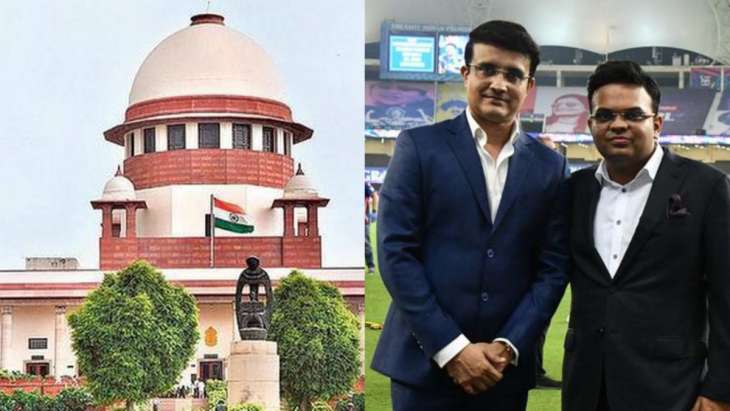SC gives take on BCCI’s plea; to pass order on tenure of office bearers including Sourav Ganguly, Jay Shah

BCCI is an autonomous body and it cannot micro-manage its functioning, observed the Supreme Court on Tuesday. The remarks by the apex court were made during the hearing on the Board’s plea seeking to amend its constitution concerning the tenure of its office bearers including its President Sourav Ganguly and Secretary Jay Shah by doing away with the mandatory cooling-off period between tenures of office bearers across state cricket associations and the BCCI.
- What did the Supreme Court say about the cooling-off period?
The top court, which said that the cooling off period will not be scrapped between the tenures of office bearers as “the purpose of the cooling off period is that there should be no vested interest,” said it will continue with the hearing Wednesday and pass order.
While the submission was being made, the bench said “BCCI is an autonomous body. We cannot micro-manage its functioning.”
- What is a cooling-off period?
As per the constitution adopted by the BCCI, an office bearer has to undergo a three-year cooling-off period between two consecutive terms in either the state association or the BCCI or both combined.
At the outset, Solicitor General Tushar Mehta, appearing for BCCI, told a bench of Justices DY Chandrachud and Hima Kohli, that the game of cricket is substantially streamlined in the country.
He submitted that the apex court has said that when the bye-laws will go into functional preparedness, some changes could be made with the leave of the court.
He said that the BCCI is an autonomous body and all the changes have been considered by the AGM of the cricket body.
Mehta said, “As the constitution exists today, there is a cooling off period. If I am an office bearer of the state cricket association for one term and BCCI for another consecutive term, then I have to go for a cooling off period”.
He added that both bodies are different and their rules are also different and two consecutive tenures of the office bearer are too short to develop leadership at the grassroots level.
The Solicitor General said, “Leadership develops at the grassroots level and it remains in the state association. By the time, his time comes for being elevated to the BCCI; he has to go for a mandatory three-year cooling-off period. One cannot become a member of the BCCI if he is not an active member of the state association”.
He said, adding that holding of the post in state association by a BCCI office bearer should not be considered for the cooling-off period.
- While submissions were made, Justice Chandrachud cautioned:
“We are engaging in discussion and not passing any judgement. Social media thinks that whatever we say in court that’s judgement but that is just a dialogue to elicit a response and better understanding of facts”.
The bench said that so an office bearer of the state association cannot hold a post in BCCI, without undergoing three years cooling-off period as per the existing constitution.
Mehta said that the concern of the court is that no one should perennially be in-charge in the cricket body and that concern has been taken care of by suggesting cooling off period, after two consecutive terms in BCCI, so that experience of “worthy administrators” does not go waste.
- What was the second amendment regarding? And what did SC have to say?
He said that the second amendment is concerning the restriction of 70 years of age in the governing council for representation to the International Cricket Council, which the BCCI wants to be gone.
The bench said, “Why should we have people above 70 years, let young people represent the country in ICC? We are not saying that people above the age of 70 years have not done exemplary work, but it’s a sport. We have our Attorney General, who is above 70, there are some doctors above 70 who are doing exemplary work in their field”.
Mehta said, “ICC is a council where it is decided, which country gets how much funds. There are heavy negotiations among the veterans from the cricket bodies across the world. My young man will have to deal with these veterans, who have 30-40 years of experience in dealing with cricket”.
He added that there is nowhere restriction on the age for ICC representation in any part of the world.
The bench said, “Do you mean to say that Cricket Australian Board or England and Wales Cricket Board do not have any age restrictions for ICC representation? Show us the material on record. We don’t have any material before us with regard to that. You place it”.
- Did the bench pass order?
No, the bench said that it would continue its hearing on Wednesday and asked amicus curiae senior advocate Maninder Singh to collate all the details.
The bench said it will pass the order.
Singh suggested that if a person has served one term of three years as an office bearer of a state association, and then he goes on to serve as an office bearer in BCCI, then he should be allowed to serve for two consecutive terms of six years in the cricket body without having to go mandatory three years cooling off period.
The BCCI, in its proposed amendment, has sought the abolition of a cooling-off period for its office bearers which would enable Sourav Ganguly and Jay Shah to continue in office as President and Secretary despite them having completed six years at respective state cricket associations.
(Inputs from PTI)
Latest Cricket News
For all the latest Sports News Click Here

